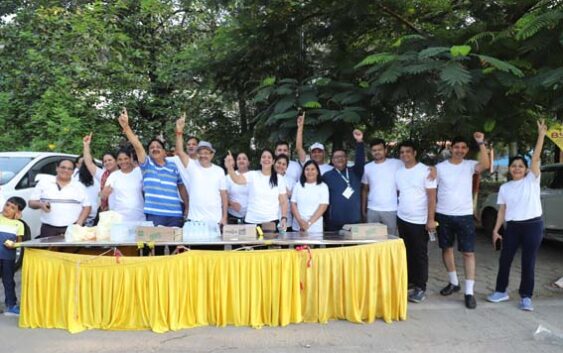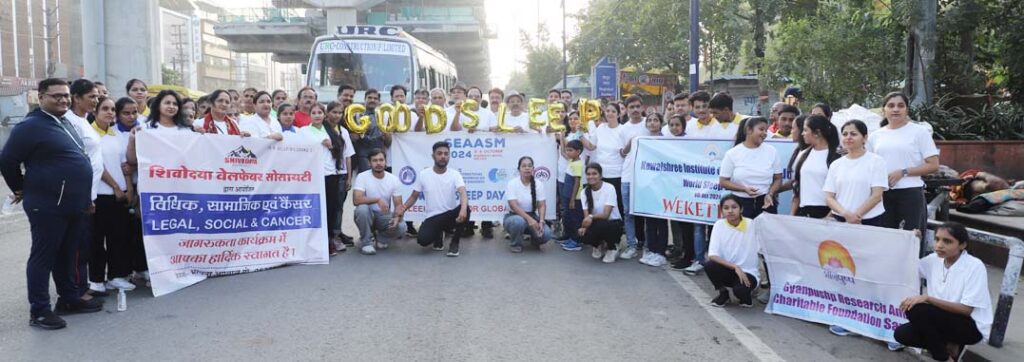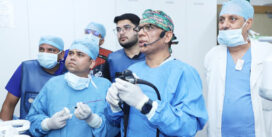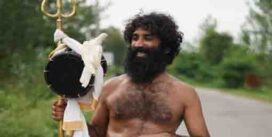Sleeping less or not at all is not a lifestyle choice; it’s a condition that requires treatment

Two-day conference on sleep disorders held in Indore
Doctors answered common public queries
Sleep issues can affect anyone, from newborns to the elderly
Indore, October 6, 2024: Sleep is one of our basic needs, but in the fast-paced life, sleep-related problems have become a common challenge. To address these issues, the first-ever two-day international conference in Central India was organized by the Southeast Asian Academy of Sleep Medicine (SEAASM). The conference saw in-depth discussions on sleep disorders, featuring sleep specialists, chest physicians, dentists, ENT specialists, neurologists, psychologists, and pediatricians from India and abroad, who shared their experiences.
The second day of the conference began with a walkathon aimed at raising awareness about sleep disorders and highlighting the importance of healthy sleep. Doctors from around the world, medical students, and people from various parts of the city participated in this event.

A special talk show was held for the general public where people shared their concerns related to insomnia, lack of sleep, snoring, etc. Experts like Dr. Salil Bhargav, Dr. V.S. Pal, Dr. Upendra Soni, Dr. Neha Rai, Dr. Shivani Swami, Dr. Rajesh Swarnkar, and Dr. Ravi Dosi provided satisfactory answers.
SEAASM President, pulmonologist Dr. Rajesh Swarnkar, said, “Lack of sleep is not just harmful to physical and mental health but also causes social and economic damage. Many problems arise due to insufficient sleep. For instance, snoring is a major cause of divorce in the country. The Bhopal Gas Tragedy, Chernobyl, and several road accidents were also results of lack of sleep. We have suggested to Transport Minister Nitin Gadkari that sleep tests be made mandatory before issuing driving licenses.”
Dr. Pratibha Dogra, a respiratory, critical care, and sleep medicine consultant from Gurugram,and the future president of SEAASM, stated, “Our organization has been training doctors and the general public about sleep disorders for many years. It is essential for doctors to inquire in detail about a patient’s sleep habits and lifestyle, conduct sleep tests, inform patients about sleep disorders, and discuss treatment options. They should also explain the side effects of sleep medications. This is vital because good sleep is crucial for our body and mind. Lack of it can lead to diseases like heart attack, high blood pressure, and diabetes.”
Dr. B.P. Singh, a respiratory specialist from Lucknow, said, “We have been researching sleep disorders for the last 20 years and found that people often think of sleep problems as normal, a part of life. But that’s not true. These problems are treatable and can be completely resolved. With the rise in obesity in recent decades, sleep-related issues have also increased, along with heart, brain, and respiratory diseases. In this conference, we have discussed solutions to these problems.”
Discussing new technologies, Dr. Milind Sovani, a respiratory and sleep medicine specialist from the UK, said, “Medical science has advanced to the point that sleep disorders can now be treated from home. Earlier, patients had to frequently visit hospitals. Now, with CPAP machines, doctors can remotely monitor sleep depth, quality, heart rate, and breathing disorders and provide treatment.”
Speaking on infant sleep issues, pediatric pulmonology expert Dr. Indu Khosla from Mumbai said, “Newborns have a sleep pattern very different from adults. They need 10 hours of sleep and sleep in short intervals throughout the day and night. However, many parents face sleep-related issues with their newborns. Certain common symptoms can help you identify sleep disorders in babies. If the baby is breathing through their mouth instead of their nose, frequently waking up from sleep, snoring, sleepwalking, or frequently changing positions, these could be signs of sleep disorders. To address infant sleep problems, establish a regular routine, provide a comfortable environment, feed the baby regularly, change diapers, maintain a calm atmosphere, and consult a doctor if needed.”
During the talk show, SEAASM Secretary Dr. Shivani Swami explained, “Sleep disorders are becoming very common these days. They not only affect our sleep but also our overall health. There are several types of sleep problems, including insomnia (difficulty sleeping), hypersomnia (excessive sleep), sleepwalking, talking during sleep, snoring, and sleep apnea (breathing stops during sleep). Snoring causes many people to have incomplete sleep, leading to fatigue during the day. To ensure good sleep, we should follow simple tips like going to bed and waking up at the same time every day, avoiding caffeine and alcohol before sleep, and stopping the use of mobile phones or computers at least an hour before bed. The bedroom should be dark, quiet, and cool. Regular exercise helps with sleep, but it should not be done right before bed. A 20-30 minute nap during the day can also help alleviate fatigue.”
Conference Organizing Secretary and pulmonologistDr. Ravi Dosi added, “Sleep is an essential part of our lives, and its deficiency affects both our physical and mental health. Lack of sleep can lead to obesity, heart disease, high blood pressure, and diabetes. The purpose of this conference was to raise awareness about sleep disorders. Experts from India and abroad gave lectures on the causes, diagnosis, and treatment of various sleep disorders. The latest research and treatments were discussed, and many useful tips were provided for those struggling with sleep problems. We are thankful to the doctors from around the world who participated in this event. The questions from the attendees showed us how necessary this conference was. Your experiences and contributions have been invaluable to us.”


